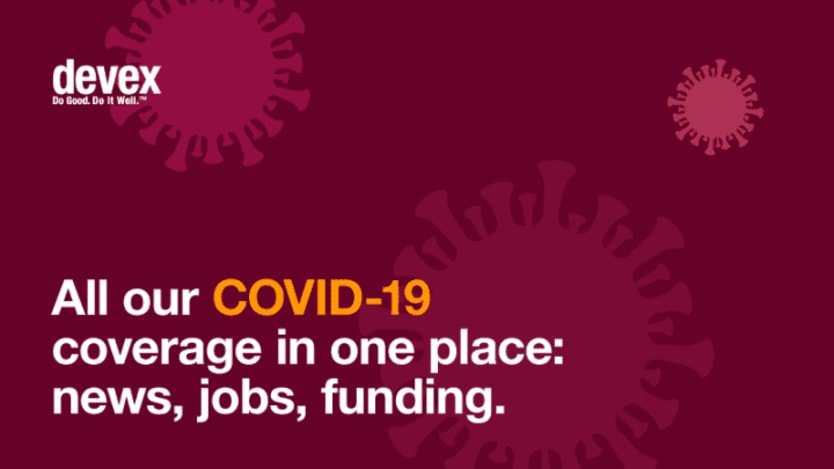
OUAGADOUGOU, Burkina Faso — When the coronavirus hit Burkina Faso in March and spread quickly across the country, many aid groups were torn about what to do.
Violence linked to Islamic militants and local defense militias had already pushed the West African nation into an unprecedented humanitarian crisis that has internally displaced over 800,000 people and forced some 2 million to be reliant on aid, according to the United Nations Office for the Coordination of Humanitarian Affairs. Yet aid workers worried that continued support could cause them to become vectors of the disease, while sick international staff could contribute to overwhelming a fragile health system.
“In the beginning, people were keen to abide by the measures because it was scary. Now it’s a constant battle to get people to wear masks.”
— Jackie MacLeod, emergency country director, International Rescue CommitteeThe country isn’t as hard hit as others in the region — 1,037 cases and 53 deaths — but it is classified as the least prepared to face an epidemic, according to last year’s global health security index. Increasing violence has closed 135 health centers, impacting over 1.6 million people who have little or no access to care.
As global COVID-19 policies shifted daily with new discoveries about the virus and ways of handling it, aid groups on the ground were inundated with information from headquarters about protocols and best practices.
Many organizations sent nonessential employees home and adjusted internal and external mandates for staff and beneficiaries, such as making people work from home, reducing the number of civilians helped at a time, and implementing coronavirus awareness sessions into projects. In some cases, due to government restrictions, programs were delayed for weeks or forced to stop completely.
Sector boundaries are blurring, says CARE secretary general
COVID-19 proves that it is time to get rid of the distinction between humanitarian and development work, says Sofia Sprechmann Sineiro.
Devex spoke with three country directors from different aid groups, all based in the capital, Ouagadougou, about how they adapted in the face of COVID-19 and how they continue to deal with challenges as the virus evolves.
Shifting staff mentalities
For International Rescue Committee Emergency Country Director Jackie MacLeod, one of the hardest parts about the coronavirus was weighing the cost-benefit calculation of her team staying or going.
“We’re here with a mandate to save lives, but if one of us gets sick and we need to be put on oxygen and we’re taking that oxygen or hospital bed away from a Burkinabe, that weighs heavy on my head,” she said. But if all internationals evacuate, local staff are left to bear the burden, she said.
IRC’s global policy was to pull out high-risk people, those with underlying health problems, or over 50. In Burkina Faso, almost all of IRC’s staff remained, except for two, deemed nonessential, MacLeod said. For the rest, strict measures were implemented.
Beyond mandatory masks, social distancing, and hand-washing, if staff wanted to attend gatherings outside the office such as funerals or baptisms, activities that the government did not ban at the onset of the outbreak, MacLeod made them self-isolate for two weeks after the event, she said.
When one of her staff contracted the virus, all staff who were defined as direct contacts and could have been infected went on lockdown and were not allowed to go into the office. This created challenges for things that required physical presence, such as signing papers, which would pile up daily.
“If one of us gets sick and we need to be put on oxygen and we’re taking that oxygen or hospital bed away from a Burkinabe, that weighs heavy on my head.”
— Jackie MacLeod, emergency country director, International Rescue CommitteeAs the number of daily coronavirus cases wanes and as the government lifts restrictions — such as the reopening of bars and restaurants, resuming public transport, and abolishing the curfew — it’s become challenging to enforce protection measures, MacLeod said.
“In the beginning, people were keen to abide by the measures because it was scary. Now it’s a constant battle to get people to wear masks, it’s a battle to get people to stop hovering over one computer and touching things together. For them it’s over, it’s done there’s no fear,” she said.
Manenji Mangundu, Burkina Faso and Niger country director at the Norwegian Refugee Council, is concerned that he has no control over what his staff do on weekends, even though employees abide by guidelines at work.
“I would tell them to think about their homes, especially if they’ll be in contact with their parents and members of the family with preexisting conditions,” he said.
Mangundu has adopted safety measures from his time working to fight Eastern Congo’s Ebola outbreak last year. To reduce the coronavirus’ spread at work, he has assigned each staff member their own coffee cup, plate, and cutlery. When quotations from vendors arrive at the office, the papers have to sit in a box for five days before anyone can touch them, he said.
In order to combat rampant misinformation about the virus, every morning at 8 a.m. Mangundu plays COVID-19 information videos from the World Health Organization, so people can better understand how to prevent it and what the real concerns are.
“It was about reassuring staff and saying, you don’t need to panic … There was so much misperception,” he said.
“We have to find ways to stay.”
— Manenji Mangundu, Burkina Faso and Niger country director, Norwegian Refugee CouncilNot abandoning communities
The most important thing for Mangundu, when adapting NRC’s programs to COVID-19, has been to ensure that the people they are helping don’t feel abandoned, he said.
“They need humanitarian assistance already, and if you abandon them when COVID-19 comes, who’s going to work with them to help them to access soap and water and things they need?” he said.
As part of its programs, NRC provides displaced people living in makeshift displacement sites with shelter, but the coronavirus has slowed down distribution.
To maintain social distancing, the number of shelter kits distributed weekly in sites like Barsalogho in the north, where thousands of people fled from violence, was cut from approximately 150 a week to 30. This impacted new and existing internally displaced people forced to cohabitate in overcrowded public spaces, such as schools or host family’s houses for longer periods, he said.
The delays and coronavirus measures that NRC implemented, such as going door-to-door to raise awareness about the virus, implementing hygiene stations, and needing more fuel for added travel, increased costs by 25%, he said. Donors, however, have been flexible; some have added a supplemental budget to cover COVID-19 related expenditures, he said.
Coronavirus forced some organizations to halt projects entirely. The International Organization for Migration had to delay training sessions with government officials about border management, migration, and protection assistance, said Abibatou Wane, head of IOM in Burkina Faso. The group also had to suspend the repatriation of 57 people currently stranded in transit centers across Burkina Faso due to border closures.
“It’s very difficult, it creates some tension … because [migrants] are here and they don’t know what to do,” Wane said.
Some people grew impatient with the wait and left the centers to forge their own way back without the help of IOM or partners, Wane said. Together with the Red Cross, the group has implemented sensitization and psychosocial activities for migrants to raise awareness about protection issues. Activities are also being implemented for migrants to more enjoyably pass the time, she said.
While borders remain closed, IOM is helping the government assess the 12 entry points in the country and recommend safety measures for reopening.
The border closures have also delayed the arrival of equipment for programs, such as chairs, tables, and other resources needed to run training.
Border closures delayed the procurement of protective gear for organizations like IRC, which provides personal protective equipment for local staff at health centers that it supports, To make existing equipment last longer, IRC taught people how to conserve things like gloves and masks, while still implementing the highest possible infection prevention and control methods, MacLeod said.
As restrictions in Burkina Faso slowly ease, aid groups continue walking the line, wanting to protect staff and beneficiaries while still providing life-saving aid.
Since May, IOM has been working on a rotational basis at the office and by the end of June everyone was back in full, Wane said. The group restarted training but now requests conference rooms double the size for the same number of participants to ensure social distancing, and hands out masks and gels to everyone attending.
Mangundu has routine discussions with staff about strictly adhering to the guidelines and to stay home if someone feels sick, he said. But most of all, he’s advising other organizations to continue working when crises arrive in places where people already need help.
“We have to find ways to stay,” he said.

